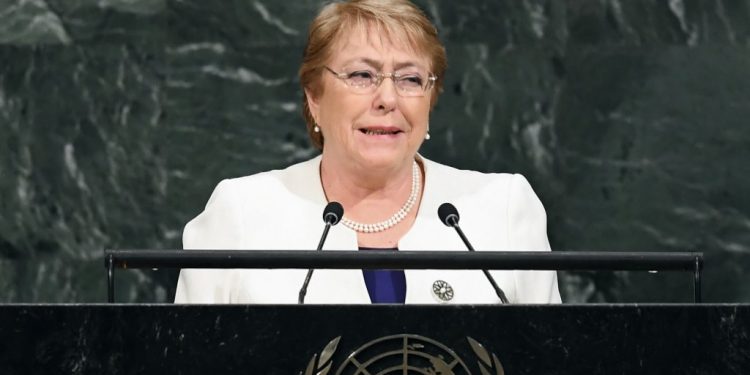On UNHRC’s bi-annual ritual of making unsubstantiated allegations against Sri Lanka
Posted on September 21st, 2020
By Sugeeswara Senadhira/Ceylon Today
Repetition of unsubstantiated allegations in session after session puts in question not just the credibility of the UNHRC’s sources of information but the credibility of the UNHRC itself

It has been a practice during the last two decades, especially since 2009 for the United Nations Human Rights Council (UNHRC) to wake up from its slumber on the eve of its September and March sessions and pick up some issue or the other in Sri Lanka to express ‘concern’.
Continuing the ‘Sri Lanka baiting’, last week at the opening of the UNHRC session, High Commissioner Michelle Bachelet expressed concern about the impact the 20th amendment to the Sri Lankan Constitution would have on the independence of key institutions including the Sri Lanka Human Rights Commission. She decided to jump the gun and make a stern statement, when the actual fact is what the government has put in the gazette is merely a draft proposal which will have to be debated in parliament, amended if necessary and be approved by a two-third majority before it becomes a constitutional amendment.
Sri Lanka strongly refuted the UN human rights chief’s remarks on the proposed 20th amendment as being unwarranted and pre-judgmental”. The draft amendment submitted through parliament will be discussed and debated following a complete democratic process in which all stakeholders will have the opportunity to present their views. Furthermore, it is for the elected law makers of Sri Lanka to decide on what is good for the country and not for an external institution that has been admonished severely for its bias by several countries including the United States.
If the Human Rights Council is going to attack countries that uphold human rights and shield countries that abuse human rights, then America should not provide it with any credibility,” American Ambassador Nikki R Haley said while announcing the US withdrawal from the Council.
In her reference to Sri Lanka last week, Bachelet charged that senior military officials accused of war crimes” had been appointed to key civilian governmental positions and alleged that attempts at the police and judiciary levels were made to thwart investigations into the said war crimes”, which she said set a very negative trend”.
It is a pity that her officials failed to bring to her notice the success of containing the COVID-19 pandemic by the Health Ministry headed by Major General Sanjeewa Munasinghe, a medical practitioner who was the head of the Army Hospital. UNHRC must clarify the demerits, if any, of appointing such a capable military officer as Secretary to the Ministry of Health.
We hope that this council would appreciate that Sri Lanka, while successfully containing the spread of COVID-19 through a balanced, multi-sectoral approach, and despite this challenge, held its commitment to the democratic processes, and conducted parliamentary elections successfully and peacefully, last month, which the EU has acknowledged,” Sri Lankan envoy told the Geneva forum.
Responding to Bachelet’s remarks, Sri Lanka’s acting Permanent Representative said that even as Sri Lanka withdrew from the co-sponsorship of Resolution 30/1, it made it clear that it will remain committed to achieving reconciliation, accountability and human rights within the framework of the Sri Lankan constitution through a domestically designed and executed process in line with the government’s policy framework.
Among other areas that came under Bachelet’s criticism was an alleged surveillance and intimidation of victims, their families, human rights defenders, journalists and lawyers. She called for an immediate end to such activities.
In response, Sri Lankan delegate said that the government has already publicly refuted these allegations and is committed to protecting and promoting freedom of expression and civil society space, and ensuring that complaints received on alleged attacks against journalists, human rights defenders and civil society are investigated and prosecuted.
The prime focus of the incumbent government is to ensure national security, and to uphold the rule of law and order in the country for all its citizens, with the aim of creating ‘an environment where any citizen can live freely without any fear for their safety and that of their families.’
It is indeed unbecoming for the HR High Commissioner to level false and unsubstantiated allegations against military officials in Sri Lanka, when the government has consistently refuted the credibility of these allegations and repeatedly pointed out that domestic processes such as the Lessons Learnt and Reconciliation Commission (LLRC) and Paranagama Commissions which examined these allegations particularly with regard to the last stages of the conflict, have not found substantive evidence against any of the senior military officials referred to in this regard.
In the absence of any substantive proof, Sri Lanka considers that the continued arbitrary accusations on crimes or crimes against humanity made against these senior military officials are unacceptable and a violation of the principles of natural justice,” Sri Lankan representative told UNHRC.
Bachelet’s statement clearly showed the ignorance of the international body about the ground situation in Sri Lanka. It is indeed erroneous that more attention has not been paid to the false information given by agencies including the OHCHR, which is required to seek the truth.
Bachelete has conveniently forgotten the need for allegations to always be subjected to the due process of investigation in accordance with established legal procedures. They should not be hastily credited to support unfounded assumptions.
While the people in North and East Sri Lanka demand more devolution of power and the imperative need to address their grievances, the Human Rights Council laments that Sri Lanka is yet to set up the special judicial mechanism to try so-called ‘war criminals.’ The action by the Sri Lankan Security Forces during the conflict was against a group designated as the most ruthless terrorist organization in the world by many countries, and not against any community. All communities in Sri Lanka were united against terrorism, and are working in unison towards reconciliation and economic progress.